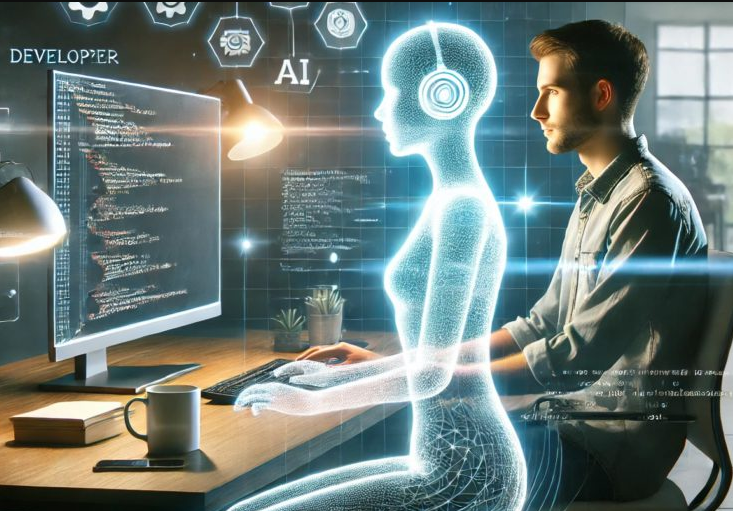The software development industry is undergoing a significant transformation. At the heart of this change is the growing integration of artificial intelligence into the daily workflow of developers. The concept of an AI powered developer is no longer futuristic. It is now an active part of how modern applications are built, tested, and deployed.
Artificial intelligence is not here to replace human developers. Instead, it is acting as a valuable partner that enhances efficiency, accuracy, and creativity. From intelligent code suggestions to automated test generation, AI is playing a critical role in accelerating software delivery and improving code quality.
Understanding the AI Powered Developer
An AI powered developer is a programmer who uses artificial intelligence based tools to assist in various phases of software development. These tools understand code context, interpret intent, and suggest relevant improvements.
Unlike traditional code editors or static analyzers, AI tools adapt in real time and learn from massive code repositories. They are capable of not only predicting lines of code but also understanding architectural patterns and recommending more efficient solutions.
Some of the most popular tools that enable AI powered development include GitHub Copilot, Amazon CodeWhisperer, Tabnine, and Sourcegraph Cody.
The Core Capabilities of AI Tools for Developers
The impact of AI tools is visible across nearly every area of software engineering. Here are several key capabilities that are making AI an indispensable part of development environments.
Code Autocompletion and Suggestions
AI tools assist developers by providing contextual code suggestions. As you type, they analyze the current file and even files across the project to offer meaningful autocompletion that fits your intent.
Automatic Test Generation
Writing unit tests can be tedious and time consuming. AI can generate test cases based on the structure and logic of your functions, helping you maintain test coverage without manual effort.
Code Explanation and Documentation
AI systems are capable of understanding and summarizing complex code blocks. This helps in generating documentation and explaining legacy code to new team members.
Bug Detection and Suggested Fixes
Advanced AI tools can detect potential issues, such as security flaws or inefficient logic, and recommend ways to fix them. This can significantly reduce debugging time and improve overall software quality.
Multilanguage Development Support
Many AI tools support multiple programming languages, making it easier for full stack and polyglot developers to work seamlessly across tech stacks.
The Advantages of Embracing AI in Software Development
The adoption of AI tools brings numerous benefits for individual developers and development teams.
Increased Developer Productivity
AI reduces repetitive and mechanical coding tasks. Developers can focus more on architecture, system design, and solving complex problems.
Faster Project Onboarding
AI tools help new developers understand existing codebases quickly by explaining code snippets and showing relationships across files.
Improved Code Consistency and Quality
By encouraging the use of best practices and standardized patterns, AI helps teams maintain consistent code quality across projects.
Enhanced Creativity and Innovation
With routine tasks handled by AI, developers have more time to explore innovative solutions and experiment with new ideas.
Leading Tools Driving AI Powered Development
Several tools have emerged as leaders in this space. Here are a few that are commonly used by developers worldwide.
GitHub Copilot
An AI pair programming assistant developed by GitHub and OpenAI. It predicts code based on your comments and existing code context.
Amazon CodeWhisperer
An AI coding companion for developers building on Amazon Web Services. It provides code recommendations and helps write secure applications.
Tabnine
A predictive AI tool that learns from your private codebase and team conventions to suggest code snippets and patterns.
Cursor
A code editor enhanced with AI capabilities that allows developers to interact with models like GPT directly inside the IDE.
Sourcegraph Cody
Designed to improve navigation and understanding of large codebases, this tool can explain functions, suggest improvements, and help search for code across repositories.
Challenges and Considerations
While the advantages are significant, there are also some challenges and ethical considerations that need to be acknowledged.
Security and Privacy Concerns
Some AI tools may use external APIs and models hosted in the cloud. It is important to ensure that sensitive code is not exposed.
Code Ownership and Licensing
Code generated by AI may include snippets learned from public repositories. It is important to understand licensing implications before using AI generated code in production.
Dependence on AI
Developers must avoid overreliance on AI. It is essential to continue thinking critically and not accept AI suggestions blindly.
Bias in Training Data
AI tools are only as good as the data they are trained on. If the training data includes biased or insecure patterns, the output may reflect those flaws.
Real World Use Cases
Many teams across the world are already using AI powered tools to improve their workflows. Startups are using AI to quickly build MVPs, enterprise teams are using it to onboard junior developers, and solo developers are using it to learn new languages and frameworks.
Final Thoughts
Artificial intelligence is reshaping the way we write software. The AI powered developer is not just more productive but also better equipped to handle the increasing complexity of modern applications. The future of development will be collaborative, where humans and intelligent systems work side by side.
Developers who learn to harness AI effectively will not only code faster but also create more maintainable, scalable, and impactful software.
References
- GitHub Copilot – https://github.com/features/copilot
- Amazon CodeWhisperer – https://aws.amazon.com/codewhisperer
- Tabnine – https://www.tabnine.com
- Sourcegraph Cody – https://sourcegraph.com/cody
- OpenAI Research – https://openai.com/research
- Stack Overflow Developer Survey
- IEEE Spectrum: AI in Software Development – https://spectrum.ieee.org
